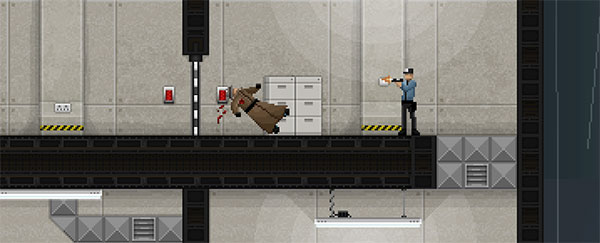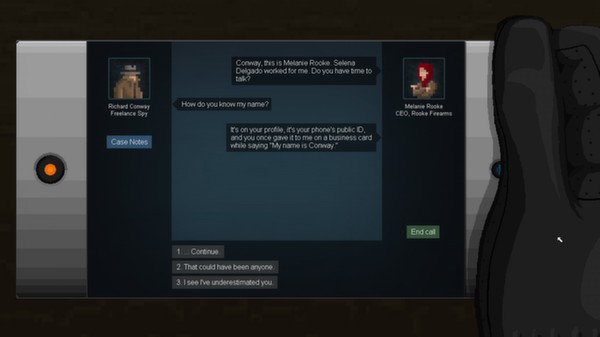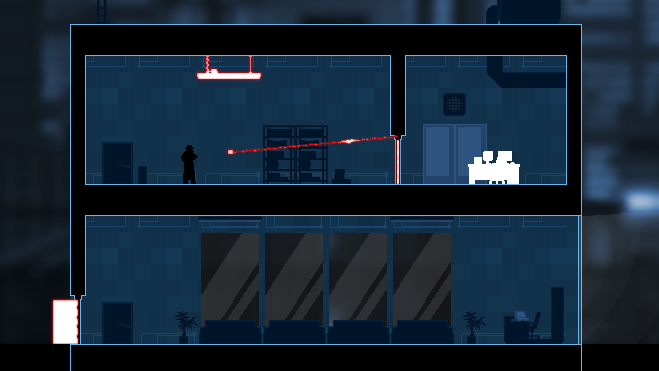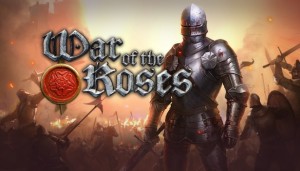
“A case of crossed wires”
If you’ve read Gameverse’s review you’ll know that Gunpoint puts you in the role of Richard Conway who has two abilities: jumping long distances without harm and rewiring entire buildings. Of course these mechanics are fantastic and I’ll hand them the spotlight a little later but they’re not what makes Gunpoint truly stand out as a great indie title.
The game’s trailer is below which showcases its game play above all else. It will give you a better feel for the mood and pacing of the game’s mechanics than I could hope to do with typed words anyways. If you watch it now I can go gung-ho on it’s narrative for the rest of the article, which I’d really like to do.
The narrative choices you make in the game will be reflected in the games finale. It gives you some more choices at the end to flush out the story your character has taken a part in. The majority of it is a strong reflection of your own impact on the story, however.
“31 dead. 33 injured. 20 jobs. $13,000. The week echoed in my mind like something that happened in the last week.”
That was the result of my play through, or at least what my character thought about it. It’s a true result of what I did throughout the game’s narrative.
It’s much easier to picture my own face and self in the game when the character’s face doesn’t actually have any defining features. Some characters have mustaches and others have long hair, but generally you can imagine their look any way you want. This makes it easier to push an impression of your own onto them and embed yourself into the narrative.
Richard Conway has his own little quirks and traits, of course, but he’s also whoever you feel like being at the time. This is done similarly to games like Mass Effect and Dragon Age (both made by Bioware) that let you choose dialogue options to both further the story and reflect upon you directly. The great divide between those AAA series and Gunpoint is that the latter can afford to give you as much damn freedom as you want. It can discover itself through your eyes and those eyes alone. The game’s over-arching story won’t change much but your perception of it will always be different based on your decisions.
There’s very few moments in the game that have only one option and in those moments it’s always the result of what you’ve already chosen to say. Of course the game’s general story follows a very wide, straight line, but it does so with elegance.
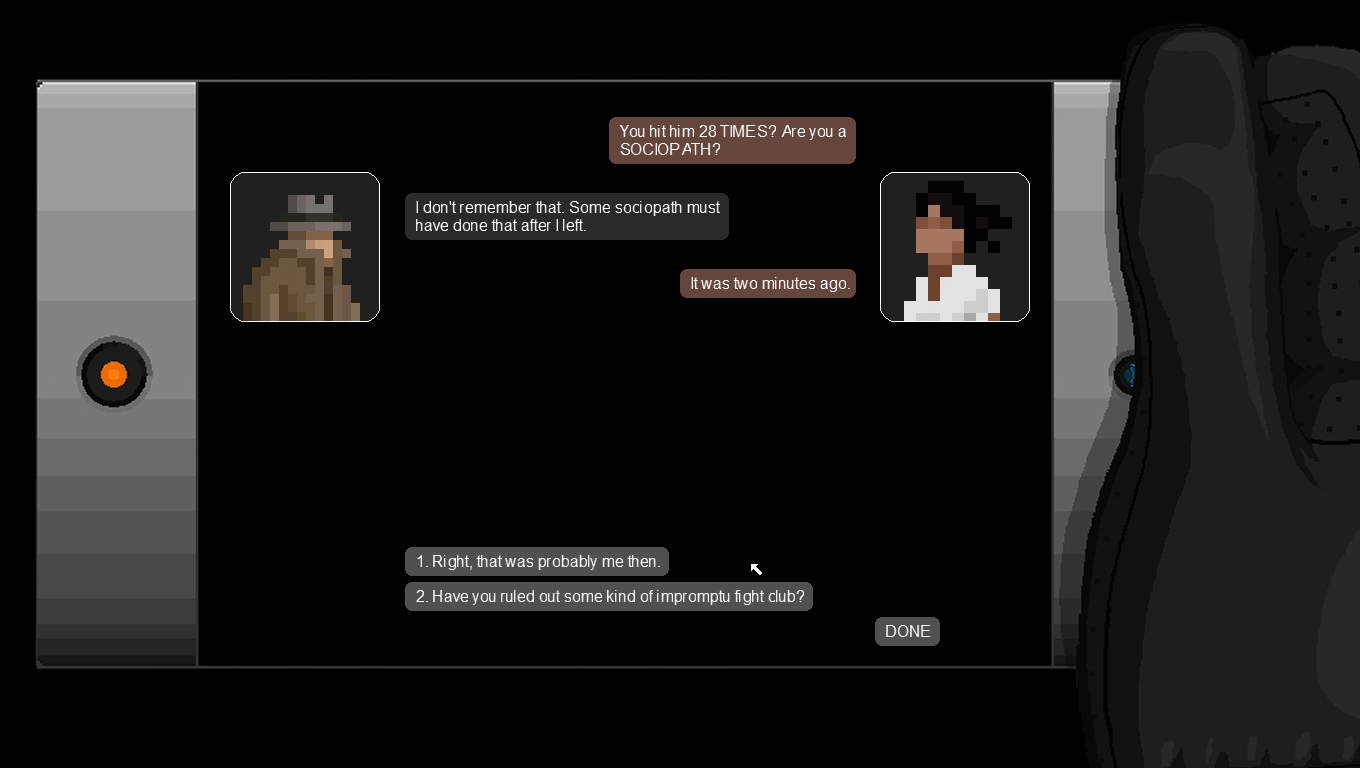
The game’s characters are mostly memorable, with a few exceptions. Your banter with the Police Chief is especially memorable as half the time he’s unknowingly paying you to chase down yourself; it’s pretty damn funny.
“They don’t let me name names on this blog, but the person behind the hit I was investigating is dead now.”
By now I sure hope you realize that these italicized quotes are from the game’s conclusion and not ACTUALLY my own writing. I have never killed a person, let alone 31 of them.
You have the standard characters in this game: the shrewd business woman, the guilty until proven innocent employee, the asshole rival business man, and the stand-up police chief. They all stick to their archetypes really well no matter what dialogue choices you make, which is a testament to how simply brilliant the game’s writing is. The best feeling about the writing is that it feels so juvenile. It feels like the first book of a great American novelist who’s just coming of age. It has wit, heavy-handed drama, and some great plot turns. While it can be predictable the plot always turned the way I was hoping it would.
The only piece that I felt the game missed was some more use of the police in the game. They appear constantly and the only interaction you have with them is the police chief.
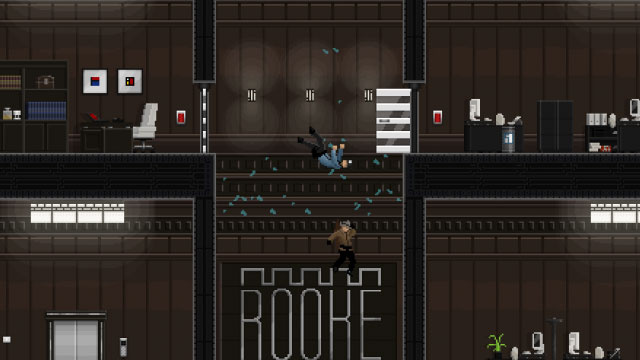
Because Gunpoint’s story is wrapped up with a simple blog post by your own character the game can fill it in piece by piece, off as many components it wants. Because the game is really only a few hours of pure game play they can afford to pull content from any or all of your decisions in the game. That single decision you make a third through the game can be reflected at the end without needing to be funneled into some larger part of the story. It’s all truly relevant.
“He played a dangerous game: insulting my hat.”
When I worked at Electronic Arts almost a year ago now, I was privy to some behind-the-scenes information about the way one of their studios formats their stories, and also their reward/scoring structure for your choices in their games. I will tell you NONE of that, because I like having a career. I can say however what’s already obvious in their story telling and how they implement your choices.
Nothing you choose REALLY matters until the end of their games. Of course some characters are going to be dead or alive but usually their games’ endings center around your character and what the end of the game spells for them, which is never really more than a couple of choices and those choices are almost always the same. The reason they need to resort to this system is because they’re narratives are so expansive and so massive. If they really let you have full freedom of choice towards the plot the development time would increase ten-fold and the amount of necessary content would be staggering.
The most unique thing about Gunpoint is that the end of the game is seen through your character’s eyes but it really revolves around the game’s supporting cast. If you’ve pissed one of them off or, god forbid, killed one of them you’re going to have a different feeling going into the final missions. Also every dialogue option is worded well and is said exactly as it’s shown. It’s a nice alternative to the “say no” and “say yes” dialogue systems in some recent, larger games.
As I mention at the beginning of this article you have some pretty awesome mechanics to use in this game. Your first is introduced immediately as your character flies from one building to another, and through a glass canopy. You can clearly jump, or fall, great distances without being harmed. Keep in mind that this is really only you* and this can be used against enemies.. Yea, it’s cool.
“The trigger man’s dead. That would have felt good if I hadn’t just taken a seven story body slam.”
You can also rewire every building in the game. Later on you’re required to hack into new groupings of systems but that doesn’t get introduced for a while. At some points you can also rewire your enemies’ guns to shoot each other, and it’s pretty morbid, but satisfying.
The most satisfying piece of the game play however is being able to punch out guards, or completely smash their faces into the ground. After you leap on someone you can knock them out with a single punch, or repeatedly punch them until red pixels begin to appear. Every punch you make is done with your left-mouse button and if you punch them enough times a small dialogue box appears saying “You err.. only have to punch them once to knock them out.”
Something that will probably go unmentioned by anyone else is how the game manages save points. It’s all based on you.
The game’s checkpoints are static but they’re presented to you in a time-based format: “1 second ago, 2 seconds ago, 20 seconds ago” as examples. When you make a move in the level the game will recognize this and it will keep the four most recent moves you’ve made constantly on record, any of which you can choose from if you die. It’s very quick and very convenient. Personally I think more games should do this so I’m not always stuck re-spawning in a room with four bandits and no ammo (I’m looking at you, Far Cry 3) and I have the option to load a few moves back.
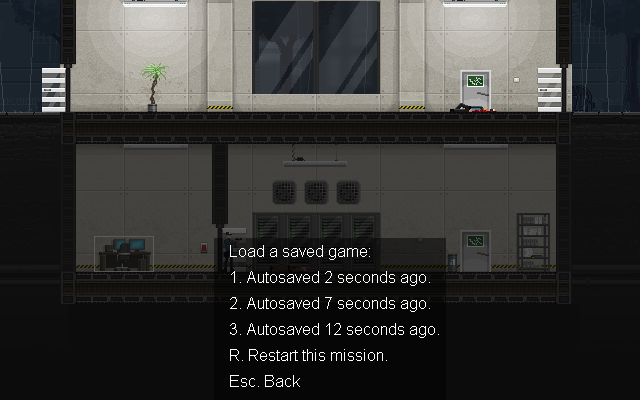
“I don’t know.
I guess I picked the least shitty of two incredibly shitty sides.”
The game’s music isn’t anything to scoff at but it’s not more than functional. It fits well but never really surprises or stands out; it’s no Hotline Miami. It’s sound effects are great however and are truly enjoyable, sometimes outweighing the glory of the mechanics themselves.
Similar to the music, the game’s art is relatively unmentionable. While it’s in all the right places and no beats are missed by it I wouldn’t call the art inspiring. It certainly feels like the game’s creator made the art himself, fine tuned it, and never really felt like going any further. While it’s functional I don’t think I’d ever call it note-worthy.
If you’re the kind of player who can get entrenched in a game that hands you the reigns for its plot then you need to look at Gunpoint. Keep in mind that the game isn’t very long however (it’s only about three to five hours) so if you’re looking for something to really dig your teeth into for a week I’d suggest something a big more hefty.
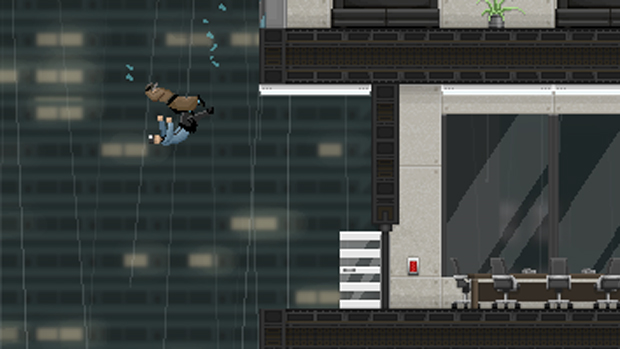
“Maybe that doesn’t matter. Maybe all that matters is that I now have the ability to kick down doors.”
Yea, you learn to kick down doors. They fly across rooms and flatten people. I can’t express how much I want you to play this game.
“Either way, I think I need 10ccs of ketamine and a Columbo marathon.”
I love Columbo. I also want to add that any game which gives you the potential to tackle people out a fourth-story window and stand up after is fun as shit, and you should experience everything it has to offer.
If you’re not comfortable throwing down $10.00 on this game right now just give it some time until Steam’s summer sale (some time in July?) and it should be anywhere from $2.50 to $7.50, for your pleasure.
– – – – – – – – – – –
I’ll save you the trouble of looking for it yourself:
https://store.steampowered.com/app/206190/.
